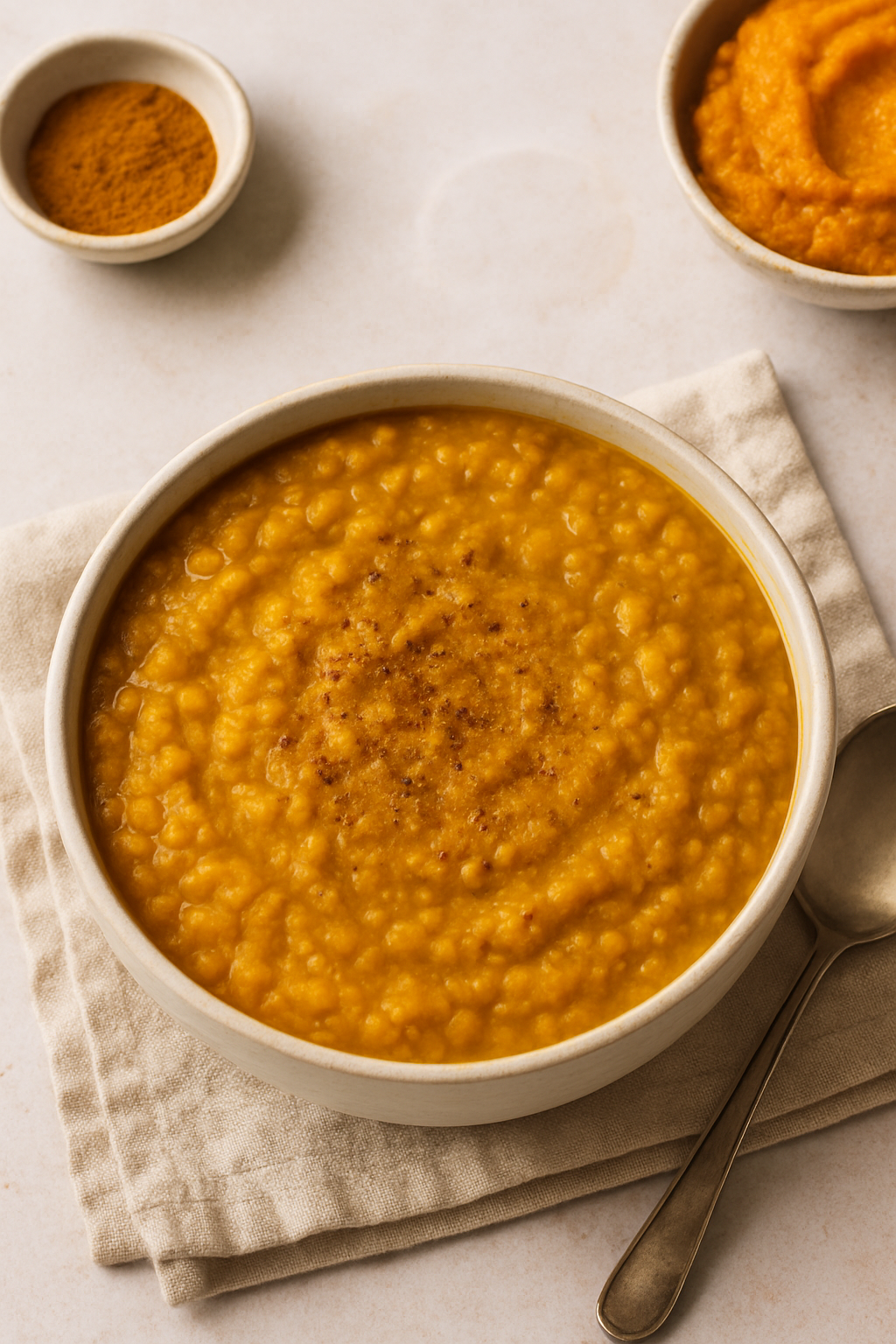” Discover the great ideas that lie inside you by discovering the power of sleep.”
For so many of us with overpacked schedules and days filled with obligations, sleep is a luxury. But what many people fail to realize is that a good night’s sleep is at the core of optimal brain function, balancing your hormones, increasing your chances at longevity, and avoiding debilitating diseases.
And the whole idea of getting your beauty rest? It turns out that is not a myth! Just sleeping poorly for one night can result in damage to your skin elasticity, hair, and nail health and create weight-loss management challenges.
Did you know that simply not getting enough restful sleep is linked to mental health issues, immune system failure, diabetes and insulin resistance, cancer, obesity, memory loss, and accelerated aging?
So, what can be done to avoid all those scary things?
Dozens of studies have been released indicating that getting a good night’s sleep is vitally essential to your well-being. Which is why I’m here to give you some science-backed tips for healthy sleep habits to send you off to dreamland with a mission!
While it’s common knowledge that we should aim for 7-9 hours of sleep per night, that’s not the only factor determining a good night’s sleep. There is a lot more to learn about what impacts your sleep efficiency.
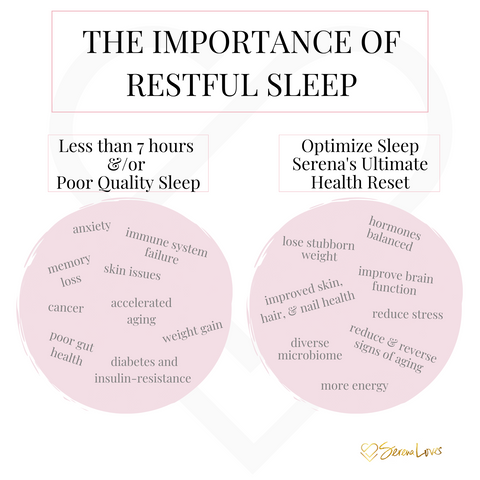
Quantity matters
The number of hours you sleep matters, but there are a few things to note.
- There is no magic number. It’s not about a specific amount, but most people say 7-9 hours is a good ball park for optimal sleep.
- To get the 7-hour minimum your body needs, you have to be in bed for 8 hours. The healthy target for “sleep efficiency” if you use a sleep tracking device, is to stay at 85% + sleep efficiency.
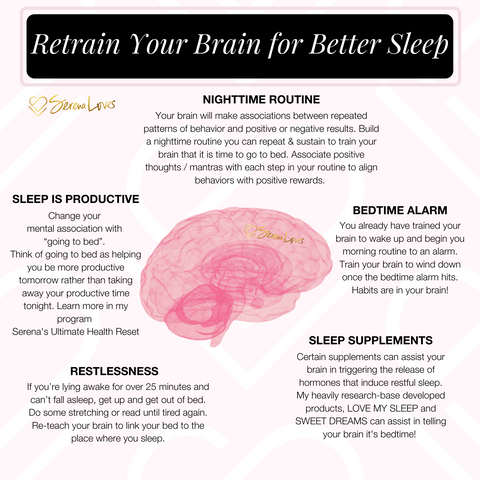
Quality matters
While quantity is important, the quality of your sleep is also essential.
According to the National Sleep Foundation, “Sleep quality is the measurement of how well you’re sleeping—in other words, whether your sleep is restful and restorative. It differs from sleep satisfaction, which refers to a more subjective judgment of how you feel about the sleep you are getting. Sleep quality is more complicated to measure than sleep quantity, but it’s not entirely subjective. Guidelines give an overview of sleep quality goals, and they include some individual and age differences. Four items are generally assessed to measure sleep quality:
- Sleep latency: This is a measurement of how long it takes you to fall asleep. Drifting off within 30 minutes or less after the time you go to bed suggests that the quality of your sleep is good.
- Sleep waking: This measures how often you wake up during the night. Frequent wakefulness at night can disrupt your sleep cycle and reduce your sleep quality. Waking up once or not at all suggests that your sleep quality is good.
- Wakefulness: This measurement refers to how many minutes you spend awake during the night after you first go to sleep. People with good sleep quality have 20 minutes or less of wakefulness during the night.
- Sleep efficiency: The amount of time you spend actually sleeping while in bed is known as sleep efficiency. This measurement should ideally be 85 percent or more for optimal health benefits.”
Getting good quality sleep gives you more energy, less of a propensity to succumb to physical ailments, less risk of diseases, and supports proper brain function.
Tips for better sleep
- Nighttime Routine: Have a nighttime routine that teaches your brain it’s time to go to sleep. Then, get ready for bed an hour earlier than usual (pjs, brush teeth, stop looking at devices).
- Set a bedtime alarm
- Try herbal teas – Have you heard of banana tea?
- Try Serena’s Plant-Based Sleep Aids : Serena’s Plant-Based Sleep Aids
- Retrain Your Brain
- Change your mental association with “going to bed.” Rather than shutting down productivity to waste time sleeping, think of going to bed as the gas you need to keep your car running.
- Restlessness – If you’re lying awake for over 25 minutes and can’t fall asleep, get up and get out of bed. Do some stretching or read until tired again. Re-teach your brain to link your bed to the place where you sleep.
In fact, A reduction in the quality of your sleep can actually be more detrimental than reduction in the quantity of sleep you are getting.
Understanding your sleep cycle of passing between Non-REM sleep and REM Sleep is powerful information as well. The two cycles are not a complete 50/50 split as far as time goes, but non-REM sleep essentially occurs the first half of the night, and REM sleep occurs the second half of the night.
REM sleep is where you dream! REM Sleep is an integral part of your health in many ways. It helps you process and store memories, promotes creativity, brainpower, and it is your natural emotional therapy session.
It’s pretty amazing knowing that your brain deals with trauma and stress from the day during REM sleep to process and soothe the edge of emotions felt.
Consistent REM sleep actually increases your lifespan.
These are some additional tips for a good night’s sleep:
- Daytime sunshine – Serotonin gets transcribed into melatonin, a helpful hormone for sleep. Did you know that sunlight helps to normalize your cortisol rhythm?
- Being on your phone 2 hrs before bed suppresses melatonin release, so if you take melatonin, it won’t do you much good. Stop all media consumption 90 minutes before bed. The artificial “blue” light emitted by electronic screens triggers your body to produce more daytime hormones.
- Reduce Stress – Have you heard of Flotation Therapy? Acupuncture and Chinese Medicine therapies have a calming effect and clear obstructions in our energetic channels. Learn more about healing your energy channels through my method Culinary Alchemy™.
- Crystals for better sleep : Howlite – Calms the mind & eliminates distractions for restful sleep
- Caffeine cut-off- have a small amount of caffeine in the mornings before 10 am. Having caffeine after 2 pm will inhibit sleep quality. It takes the average human approximately eight hours to digest half of the caffeine they’ve consumed that day.
- Alcohol – Refrain from alcohol or cut-off 2 hours before bed. REM sleep is significantly disrupted when you drink alcohol. Not only will your brain and body not be able to rejuvenate, but alcohol also disrupts your memory processing stages.
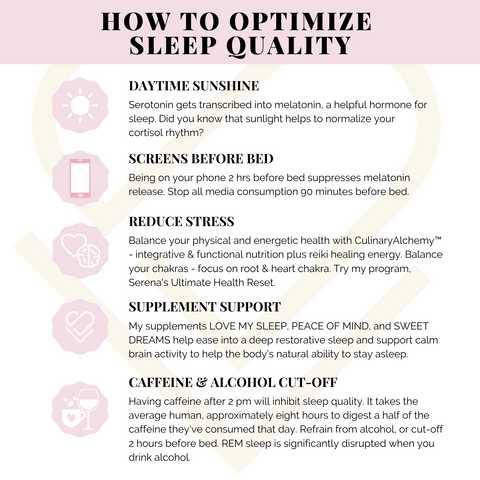
Other Healthy Habits That Can Actually Help You Sleep Better, according to The American Cancer Society are:
- Go to sleep at the same time each night, and get up at the same time each morning, even on the weekends.
- Don’t take naps after 3 pm, and don’t nap longer than 20 minutes.
- Get regular exercise, but not within 2-3 hours of bedtime.
Sleep and your immune system
Not only does not getting good sleep make you more susceptible to viruses, but it also makes it more difficult for your body to recover. When you get a good night’s sleep, it helps support your immune system’s incredible functions.
During sleep, your immune system releases proteins called cytokines, inflammatory agents that go to the site of infection and actually help promote your sleep quality. So production of these cytokines actually needs to increase when you have an infection or inflammation and when you’re stressed.
Sleep deprivation can actually decrease the production of these protective cytokines, and that’s how you become more likely to suffer from an infection. Getting 7-9 hours of restful sleep allows for the proper functionality of the cytokines and, therefore, a strong immune system! Make sure you get good sleep to keep your defense system working for you at its best.
Also – Your killer-T cells, which are the white blood cells that fight viruses and infections, are produced during stages 3 & 4 of your sleep cycle.
Sleep supplements and support
Should You Take A Melatonin Supplement?
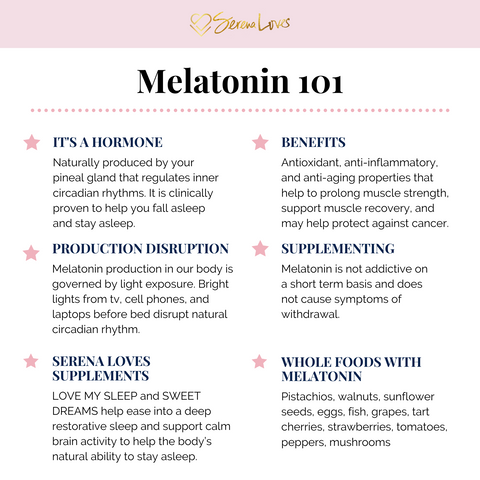
Experimenting with a supplement and including more whole foods is an effective method to improving sleep. According to the National Sleep Foundation, melatonin is not addictive on a short-term basis and does not cause withdrawal symptoms. However, some people say they struggle to fall asleep after using melatonin supplements for extended periods.
I recommend my supplements *Coming Soon* – LOVE MY SLEEP, PEACE OF MIND, and SWEET DREAMS supplements help ease into a deep restorative sleep and support calm brain activity to help the body’s natural ability to stay asleep. Both of these supplements contain melatonin and blends of botanicals, nutrients, and neurotransmitter precursors designed to support quality, restful sleep.
I hope to empower you with knowledge around sleep optimization to make decisions to improve your overall well-being and support you in your wellness journey through my new program – Serena’s Ultimate Health Reset!
Get more Sleep Quality Tips
Serena’s Top Sleep Tips + Nighttime Routines from Sleep Experts on Serena Loves IG LIVE :
Learn more about getting amazing sleep here
The Science of Beauty Sleep READ HERE
by




